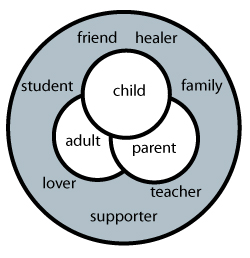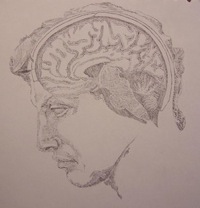
Mind and Beinglast authored: Sept 2009, David LaPierre
Our mind and being is composed of the ABC's: Affect (emotions) Behaviours (choices) Cognition (mind, thoughts, perceptions, memories, and beliefs) |
|
- who we are
- healthy and unhealthy development
- consequences
- healing and wholeness
- additional resources
Who We Are
Our being also consists of the personality, purpose, and hope.
Some believe humans are intrinsically good; others believe the world of brokeness we live in has affected us from before birth. Almost everyone believes we have intrinsic self-worth, value, and dignity.

We have the capacity to think and decide for ourselves to a very large degree, though experiences and our subconscious can affect our cognitive capacity.
We also assume roles and states throughout life, as shown in the image alongside. There are core archetypes (ego states) and many other roles we can play in our relationships with others. We do this to survive and to meet our needs.
These roles and states can be healthy or unhealthy, depending on the health of the ABC's of everyone involved.
They can also flip suddenly and unexpectedly, as occurs during games.
Our lives are a steady stream of parallel experiences, some good, some bad, some transient, some lasting.
Disappointment is the child of expectation
Healthy and Unhealthy Development
We come into this world a relatively empty neural slate, waiting to be molded via experiences and relationships, importantly through attachment.
We receive what we need from people; it's best if our needs are met by the good milk, but we'll take the bad just to avoid isolation. Negative attention is still attention.
We also receive what we need from people: recognition and stimulation. It's best if our needs are met by the good milk:
- attention
- love
- honesty
- faithfulness
- direction
We also have a need for structure hunger.
Life stages - childhood, adolescent, adulthood, and senior years, bring with them growth as we communicate, learn, and remember.
The decisions we make, to get our needs met and emulate those around us, begin forming our view of the world, affecting our ABCs - how we feel, act, and think. This happens at a very early age, within the first few months of life.
Neuropsychiatry
Molecules and cells are the scaffolding for development, and genetic mutation and chromosomal abdormalities accordingly play key roles in mental health susceptibility and disorder. Often these interact with our environment to result in symptoms.
If we are raised in an unsafe, unnourishing environment, we can become increasingly burdened with wounds and leading to consequences (next tab).
---in depth information below---
other information
a goal is a change. you get what you focus on.
Children have an empty neural slate.
Neural patterns are picked up, especially from parents.
We are initialy very sensitive to what is around us, creating a vulneralbility.
Attachment
We are hardwired to attach to one another as we grow in our families and communities. Attachment clearly provides physical safety and nourishment, but we as humans need more than this - love, respect, honesty, understanding, and attention. We need these from external sources as we grow, becoming increasingly capable of securing them from ourselves and others as we develop in healthy ways. The success we have as children will determine our views of these attributes as adults and future attempts at keeping them in our lives.
stretching
Uncertainty is critical in our development; challenges allow us to stretch, grow, and become more resilient. However, too much stretching, leading to a lack of resolution, can be damaging and lead to avoidance.
Difficult circumstances need to be resolved by children, ideally with the support of their parents and tools provided by them. However, if children are unable to fully process their circumstances, due to their magnitude or a lack of skills, a child may become emotionally or cognitively overwhelmed. The impact of this can be thought of as a trauma from which a child cannot heal.
The opposite may also be true; a parent may shield a child from negative emotions, preventing them from developing tools from an early age that will allow them to navigate the challenges sure to arise in life.
The parent therefore has a substantial role to play in providing the soil in which children grow.
Our early relationships are believed to be incredibly important in defining our adult sense of self and thereby overall mental health.
This is underpinned by neurobiology, though not fully explaned by it.
Consequences
We face the consequences of our decisions and actions, buffered by grace from others and beyond. We also experience the brokeness of others. Our hurts and hurts in those around us have a significant impact on us.
Symptoms
Externalizing vs internalizing symptoms....
Symptoms that can develop from unhealthy living include:
- (A) poor emotional experience
- (B) poor choices
- (C) disorganized/inaccurate thinking
Drinking the bad milk can distort the way we see and experience the world as we live through unhealthy lenses.
These distortions lead us to play games with people in order to be validated.
States of substantial disorder can develop, including:
People can become increasingly energized in the mental state, leading to violence and suicide.
Children/adolescents and expectant/new mothers have unique challenges.
Healing and Wholeness
Often when circumstances become severe enough, hospitalization is required to stabilize people.
An understanding of the situation is required for stabilization and resolution. This is often termed formulation, and can include emotional release (breakthrough) at the same time.
Following this time, people are often very receptive to intensive clinical efforts. Targets ideally include, at the very least, the ABC's - affect, behaviour, and cognition.
Affect, or emotion, needs to be uncovered and released for a person to have healing in the majority of cases. Dynamic psychotherapy, including intensive short term dynamic psychotherapy, allow access to and liberation of emotions. The emotional freedom technique is used by some health care practitioners.
Behaviours, or choices, can be structured in group programs and individual goal setting. Behavioural therapy focuses primarily on choices and actions. Choices we make often depend on insight into our early developmental ABC's and on the desire and decision to change.
Cognition can be altered through cognitive behavioural therapy or other psychotherapies. If people are not in touch with their emotion, reformulating their cognition can be helpful. Early unhealthy decisions or realizations, a part of our unhealthy lenses, need to be surfaced, released, and restored.
Relationships almost always need to be restored. Interpersonal therapy focuses on relationships.
Psychotherapists often talk of a contract for healing, in which patient and healer together decide what change is desired.
- 'what are you willling to change today?'
As people move through psychotherapy, it is important for them to re-establish external resiliency. This can include carers - family physicians, mentors, pastors - as well as family and friends. This environment is very important.
Additional Resources

